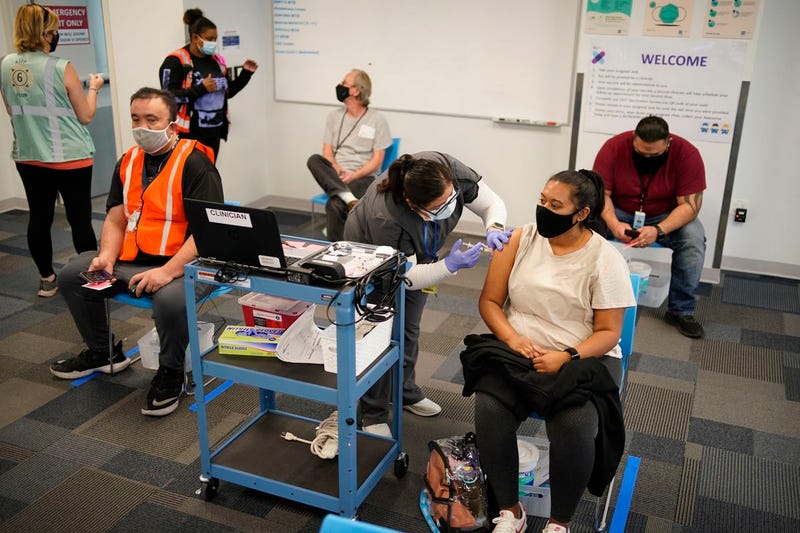
A growing number of labor unions and companies are securing COVID-19 vaccine shots for their employees as eligibility widens. Some large companies such as Amazon are offering workplace vaccinations through licensed health care providers, while smaller outfits are booking appointments for workers at outside locations.
Ford Motor Co. and the United Auto Workers opened up on-site vaccinations Monday in Kansas, Michigan, and Ohio. In Ohio, Gov. Mike DeWine had initially put a stop to workplace clinics out of concern they would tie up supply, but he allowed them to resume last week as demand dropped at the state's mass vaccination sites.
Amazon launched its long-anticipated on-site vaccinations last month in Kansas, Missouri and Nevada. Warehouse and other front-line workers can sign up for shots at kiosks or through Amazon’s employee app.
For employers, the vaccines are a critical step toward restoring normalcy at a time when they expect a spike in demand for their services as more people get inoculated. They are also betting that employees who did not initially trust the vaccine will have a change of heart when they see co-workers receiving it.
For workers, employer assistance with the vaccine eliminates hurdles, including transportation issues or maneuvering through a patchwork of websites to find appointments. That access could help to narrow the racial and socioeconomic gaps that have opened in the country’s vaccination drive.
Despite the growing number of companies offering on-site vaccinations, there are signs that some may have lost interest. In March, when vaccine eligibility was widening and distribution efforts improving in the U.S., a survey by the consulting firm Gartner found 30% of companies planned to bring vaccines to their employees. That was down from 42% in January, when distribution was still spotty and obtaining appointments was still extremely difficult for most people.
Nonetheless, prominent companies continue to join the list of those offering on-site vaccinations.
Yogurt maker Chobani, which employs 2,200 people in the U.S., partnered with a local pharmacy to vaccinate hundreds of its employees at its Twin Falls, Idaho, plant, according to the company’s chief People and Culture Officer Grace Zuncic.
American Airlines, Subaru, chicken producer Mountaire Farms, and agricultural equipment maker Vermeer are among 40 companies that brought vaccines to their employees through partnerships with Premise Health, a direct health care provider. American Airlines is administering vaccines at airports in Chicago, Charlotte, Tulsa and Dallas-Fort Worth, according to the company.
Tyson Foods, one of the world’s largest food companies, said it has vaccinated nearly 40,000 employees — nearly one-third of its workforce — at vaccination events in 16 states. Tyson also expanded its on-site event last week to include eligible family members of employees.
Employer-organized vaccination events, along with incentives such as bonuses or paid time off, allow companies to keep track of how many employees get vaccinated. Employer are legally allowed to require the vaccine, but the vast majority have shied away from doing so; some say it doesn't make sense to do so until everyone is eligible and there is sufficient supply.
Still, the idea is gaining some traction. While Gartner's March survey showed just 8% of companies planned to require employees to show proof of vaccinations, that number was up from 2% in January.
By ALEXANDRA OLSON, Associated Press
